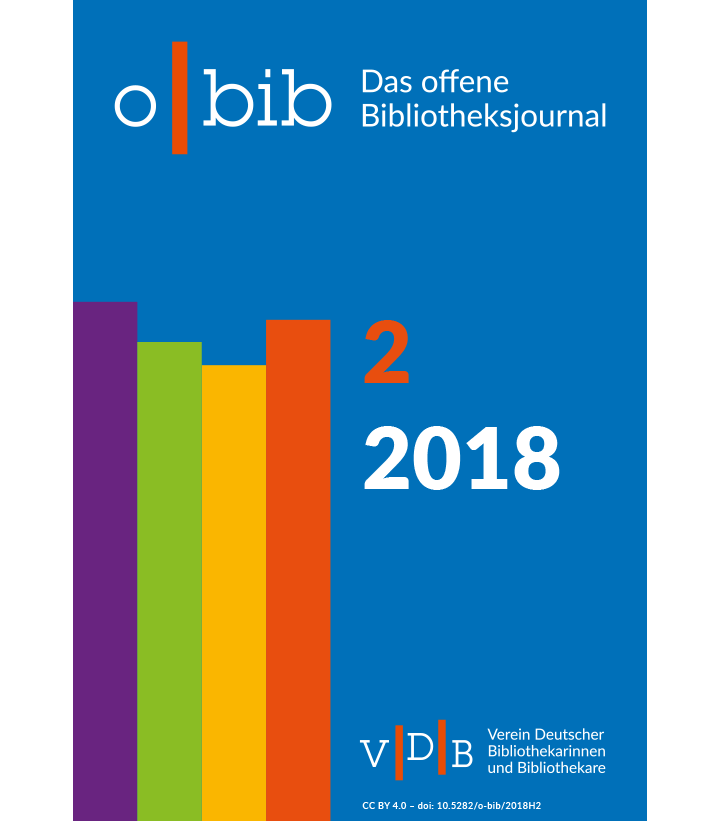Zeitretrieval in der verbalen Inhaltserschließung
DOI:
https://doi.org/10.5282/o-bib/2018H2181-192Keywords:
Inhaltserschließung, Zeitfacette, RetrievalAbstract
Die Zeitdimension spielt im Retrieval oft eine wichtige Rolle. Dennoch ist eine inhaltliche Suche nach der Zeitfacette in Katalogen und anderen Recherchesystemen kaum sinnvoll umgesetzt, da die zugrundeliegenden Erschließungssysteme die Erfassung der Zeitfacette nur unzureichend abbilden. Der Artikel stellt kurz den Status quo dar und entwickelt eine Idee für ein verbessertes Retrieval der Zeitschlagwörter bei der inhaltlichen Erschließung.
Time plays an important role in bibliographic retrieval. Despite of that, the results of subject-focused time searches in library catalogs and other retrieval systems are often inadequate, as the cataloging and indexing systems do not sufficiently represent the time aspect. The article explains the status quo and goes on to discuss an idea for an improved recording and retrieval of temporal subject headings.
References
– Deutsche Nationalbibliothek. Regeln für die Schlagwortkatalogisierung: RSWK. 4., vollständig überarbeitete Auflage 2017. Stand: März 2017. urn:nbn:de:101-2017011305.
– Frommeyer, Jutta. Zeitbegriffe und Zeitcodierungen in allgemeinbibliographischen Datenbanken: Eine Analyse von RSWK, LCSH und RAMEAU sowie Entwicklung eines theoretischen Modells für ein Zeitretrieval. Berlin: Logos-Verl., 2003.
– IFLA. „Bibliographic Conceptional Models.” Zuletzt geprüft am 28.03.2018. https://www.ifla.org/node/2016.
– IFLA. „Functional Requirements for Authority Data FRAD (2009).” Zuletzt geprüft am 28.03.2018. https://www.ifla.org/publications/functional-requirements-for-authority-data.
– IFLA. „Functional Requirements for Bibliographic Records FRBR (1998).” Zuletzt geprüft am 28.03.2018. https://www.ifla.org/publications/functional-requirements-for-bibliographic-records.
– IFLA. „Functional Requirements for Subject Authority Data FRSAD (2011).” Zuletzt geprüft am 28.03.2018. https://www.ifla.org/node/5849.
– IFLA. „Library Reference Model (IFLA LRM) (2017).“ Zuletzt geprüft am 28.03.2018. https://www.ifla.org/publications/node/11412.
– International Organization for Standardization. „ISO 8601 Date and time format: Data elements and interchange formats – Information interchange – Representation of dates and times.“ Zuletzt geprüft am 28.03.2018. https://www.iso.org/standard/40874.html.
– Scheven, Esther. „Rezension zum Buch von Jutta Frommeyer: Zeitbegriffe und Zeitcodierungen in allgemeinbibliographischen Datenbanken.“ Zeitschrift für Bibliothekswesen und Bibliographie 50 (2003): 295–297. Zuletzt geprüft am 28.03.2018. http://zfbb.thulb.uni-jena.de/servlets/MCRFileNodeServlet/jportal_derivate_00001835/j03-h5-rez-1.pdf.
– Wening, Michael. Die Zeitfacette in bibliothekarischen Erschließungen: Eine Analyse unter besonderer Berücksichtigung von sachlicher Erschließung und Retrieval. Masterarbeit im Rahmen des Masterstudiengangs „Bibliotheks- und Informationswissenschaft“. Berlin: Humboldt-Universität, 2017. Zuletzt geprüft am 28.03.2018. http://d-nb.info/1149163542.
– Wiesenmüller, Heidrun. Recherche über Zeitschlagwörter: Brainstorming. Unveröffentlichtes Manuskript (2011).
Downloads
Published
Issue
Section
License
Copyright (c) 2018 Michael Frederic Wening, Esther Scheven

This work is licensed under a Creative Commons Attribution 4.0 International License.





